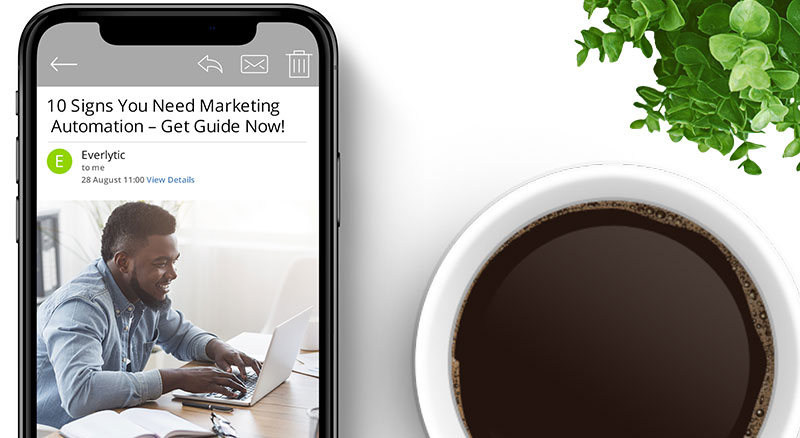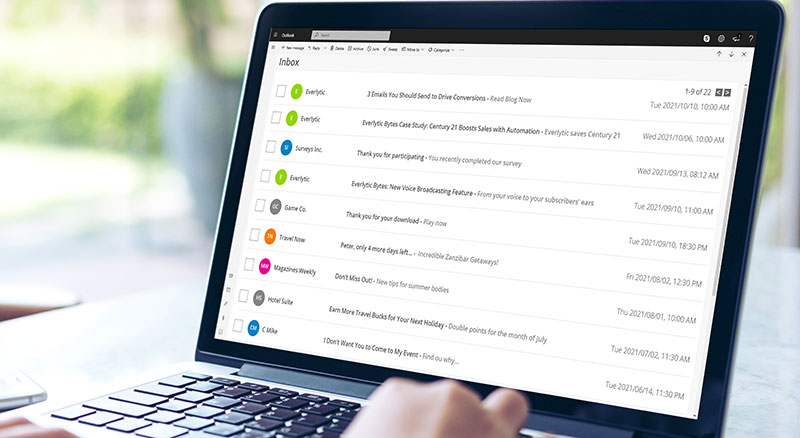Without a doubt, email subject lines are one of the most crucial elements of your emails. After all, this is what subscribers see first in their inbox and it determines if they open your email or not. If you’re looking for tips on how to write strong email subject lines to boost your open rate — you’ve come to the right place. Read on.
Why are Subject Lines Important?
- They Offer Value. The best subject lines communicate the promise of value. Your subject line must assure the recipient that the email contains information or messaging that will improve their lives and/or their businesses.
- They Pique Interest. Subject lines must be interesting and unique. Forget about using clichés and try to give your audience something that captures their attention and pushes them to open the email. Also, make sure that your subject line doesn’t have spelling or grammar errors.
Types of Email Subject Lines
Subject Lines Referring to Numbers & Lists
By including numbers in your subject line, you increase the chances of your emails being opened because our brains are naturally drawn to digits. This is why top 10 lists are so popular. Our brains process lists easier, and they provide the promise of a quick and easy read.
Numbers and lists in email subject lines stand out because they are visually impactful. Check out these examples:
- 10 Celebrities Who Have Been Ruined by Plastic Surgery
- The 8 Most Annoying Moments of the 2020 Oscars
- 7 Jaw-Dropping Drift Videos on Youtube
- Join More than 500 Others at This Event!
- 5 Things You Should be Doing Every Morning

Subject Lines that are Personalised
It’s good practice to understand your audience well enough to know what language, style, and offers will be attractive to them. This is where personalisation comes into play.
Including personalisation in email subject lines is another way to boost your email open rate. For example, you could add a reader’s name or include location-specific words in the subject line (like Hyperli does), so readers know the content is relevant to them.
eCommerce businesses send deals based on past purchases. Some also use remarketing to send deals to customers that have looked at products but didn’t end up buying.
Subject Lines with Questions & Punctuation
Question marks and other punctuation offer another method for standing out from the email crowds. Asking your reader a question instantly engages them, because it brings an element of a dialogue, making them more likely to open your emails.
Careful though; exclamation marks are often over-used in subject lines, and they may even increase your email’s chances of landing in spam. Try experimenting with some other fun symbols to attract readers.
Subject Lines Using Scarcity Tactics
Knowing that something is about to go away creates tension. This causes people to fear that they could miss an opportunity to get what they want. That’s exactly the kind of tension some of your email subject lines can evoke.
Email subject lines that incorporate scarcity often perform well; this language is also common practice with squeeze pages. Add in some scarcity words like in these examples and you may be surprised how your click rates change:
- Peter, Only 4 More Days Left…
- 60% Off Sale Ends Today! Hurry, This is Your Last Chance…
- Uh-oh, Your Prescription is Expiring
- I Hate to Say No, But Today Really is Your Last Chance
- Your Time is Running Out Candice…
Controversial / Striking Subject Lines
As the saying goes: Controversy sells. Using controversial subject lines may certainly grab your reader’s attention but requires you to tread carefully. This strategy may get your emails opened, but you may lose some customers too. You must be confident in your understanding of your audience’s tastes and perceptions before implementing this tactic.
Look at the examples below for an idea of how other businesses do this:
- Why Your 6-Year-Old Is More Digital Than Most CFOs
- 4 Tech CEOs That Need to Resign Immediately
- Your Marketing Sucks: Why You Need to Think Local
- Everything You’ve Ever Heard About This Food is Wrong
- I Don’t Want You to Come to My Event

Best Practices for Subject Lines
- Always use “you” and “your”. Your readers need to feel like you are speaking to them individually.
- Say “Yes” to alliteration. Alliteration is when you use the same letter or sound to start several words in a sentence. For example: An ample amount of alliteration attracts! Give alliteration a try to come up with catchy email subject lines.
- Put yourself in the “from” field. Research shows that 86% of email recipients say that the “from” name matters. Keep your “from” section professional and consistent for business subject lines. Most business emails use their brand name in the “from” field or go with something like “John Smith from Everlytic”.
- Always A/B test subject lines. It’s best practice to A/B test your email subject lines since this testing technique will enable you to make data-driven decisions and ensure a positive impact.
- Pay attention to the preview. Some email clients have a built-in preview pane that shows readers an intro to the email – and in Everlytic, you can customise it. Use your preview text to support your subject line and increase your open rate.
A subject line is the first thing that grabs your reader’s attention. Use the tips and best practices shared in this post to craft strong email subject lines that boost your open rate.



